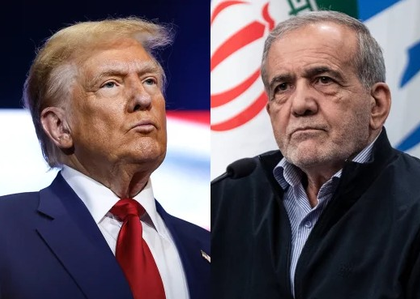India labels US-Iran nuke talks as 'positive development'
By IANS | Updated: April 17, 2025 18:57 IST2025-04-17T18:51:00+5:302025-04-17T18:57:15+5:30
New Delhi, April 17 India on Thursday labelled the ongoing US-Iran nuclear talks as a "positive development", hoping ...

India labels US-Iran nuke talks as 'positive development'
New Delhi, April 17 India on Thursday labelled the ongoing US-Iran nuclear talks as a "positive development", hoping that the negotiations would lead to the resolution of the concerned matter and contribute to peace and stability in the region.
"We see the ongoing US-Iran talks as a positive development. We have always stood for dialogue and diplomacy as the way forward on such issues. We hope it will lead to the resolution of the matter, to the mutual satisfaction of all concerned, and contribute to peace and stability in the region," Randhir Jaiswal, spokesperson for the Ministry of External Affairs (MEA), said during a weekly media briefing in New Delhi.
The venue for the second round of indirect negotiations between Tehran and Washington on Saturday will be Italy's capital Rome, said Iran's Deputy Foreign Minister Kazem Gharibabadi
"Up to this point that we are speaking, we have received no new request from the other side for changing the location of the negotiations and Rome will be the venue for the second round," Gharibabadi said in a live televised interview late Wednesday.
Regardless of the negotiations' venue, Oman will continue to facilitate and mediate them, the official added.
Iran's Foreign Minister Seyed Abbas Araghchi and US Special Envoy to the Middle East Steve Witkoff are scheduled to hold the second round of their indirect talks on Saturday. The talks mainly center on Iran's nuclear programme and the removal of the US sanctions on the country.
Witkoff on Tuesday said Iran “must stop and eliminate” its nuclear enrichment programme to reach a deal with the United States, contradicting his remarks the preceding day that Tehran's uranium enrichment at a low level could be allowed.
“A deal with Iran will only be completed if it is a Trump deal. Any final arrangement must set a framework for peace, stability, and prosperity in the Middle East -- meaning that Iran must stop and eliminate its nuclear enrichment and weaponization programme. It is imperative for the world that we create a tough, fair deal that will endure, and that is what President Trump has asked me to do,” Office of U.S. Special Presidential Envoy Steve Witkoff posted on X.
In the first round of Muscat talks last week, Araghchi engaged in “indirect” discussions with Witkoff, facilitated by Omani Foreign Minister Sayyid Badr bin Hamad bin Hamood Albusaidi. These talks focused on Iran's nuclear programme and the potential removal of US sanctions.
The talks were proposed by US President Donald Trump, who threatened Iran with bombing and secondary tariffs if Tehran did not come to an agreement with Washington over its nuclear programme.
Iran signed a nuclear deal, formally known as the Joint Comprehensive Plan of Action, with six major countries — Britain, China, France, Germany, Russia, and the United States — in July 2015, accepting restrictions on its nuclear program in return for sanctions relief.
However, the US withdrew from the deal in May 2018 and reinstated sanctions, prompting Iran to scale back some of its nuclear commitments. Efforts to revive the nuclear deal have not achieved substantial progress.
Disclaimer: This post has been auto-published from an agency feed without any modifications to the text and has not been reviewed by an editor
Open in app